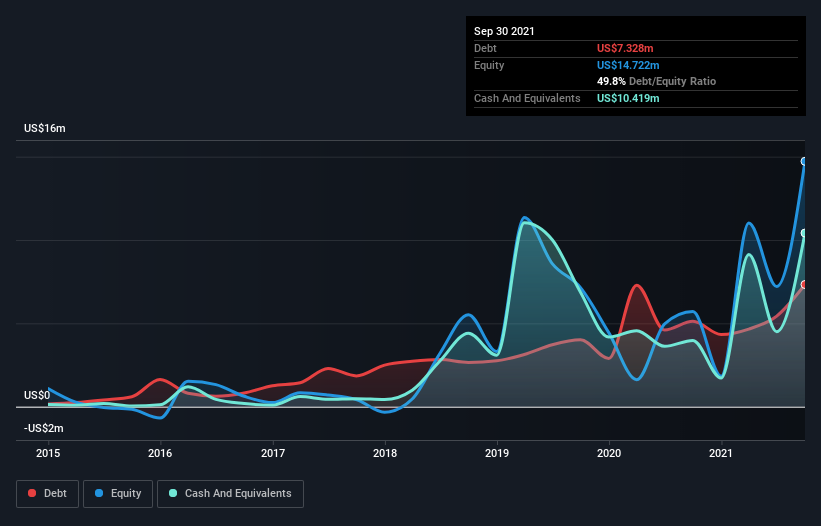Is Alkaline Water (NASDAQ:WTER) Using Too Much Debt?
Legendary fund manager Li Lu (who Charlie Munger backed) once said, 'The biggest investment risk is not the volatility of prices, but whether you will suffer a permanent loss of capital.' When we think about how risky a company is, we always like to look at its use of debt, since debt overload can lead to ruin. We can see that The Alkaline Water Company Inc. (NASDAQ:WTER) does use debt in its business. But the more important question is: how much risk is that debt creating?
When Is Debt A Problem?
Generally speaking, debt only becomes a real problem when a company can't easily pay it off, either by raising capital or with its own cash flow. Part and parcel of capitalism is the process of 'creative destruction' where failed businesses are mercilessly liquidated by their bankers. However, a more common (but still painful) scenario is that it has to raise new equity capital at a low price, thus permanently diluting shareholders. Of course, plenty of companies use debt to fund growth, without any negative consequences. When we think about a company's use of debt, we first look at cash and debt together.
Check out our latest analysis for Alkaline Water
What Is Alkaline Water's Debt?
As you can see below, at the end of September 2021, Alkaline Water had US$7.33m of debt, up from US$5.12m a year ago. Click the image for more detail. But it also has US$10.4m in cash to offset that, meaning it has US$3.09m net cash.
A Look At Alkaline Water's Liabilities
According to the last reported balance sheet, Alkaline Water had liabilities of US$16.9m due within 12 months, and liabilities of US$193.8k due beyond 12 months. Offsetting these obligations, it had cash of US$10.4m as well as receivables valued at US$11.0m due within 12 months. So it actually has US$4.30m more liquid assets than total liabilities.
This surplus suggests that Alkaline Water has a conservative balance sheet, and could probably eliminate its debt without much difficulty. Succinctly put, Alkaline Water boasts net cash, so it's fair to say it does not have a heavy debt load! The balance sheet is clearly the area to focus on when you are analysing debt. But it is future earnings, more than anything, that will determine Alkaline Water's ability to maintain a healthy balance sheet going forward. So if you want to see what the professionals think, you might find this free report on analyst profit forecasts to be interesting.
In the last year Alkaline Water wasn't profitable at an EBIT level, but managed to grow its revenue by 26%, to US$52m. With any luck the company will be able to grow its way to profitability.
So How Risky Is Alkaline Water?
We have no doubt that loss making companies are, in general, riskier than profitable ones. And in the last year Alkaline Water had an earnings before interest and tax (EBIT) loss, truth be told. Indeed, in that time it burnt through US$26m of cash and made a loss of US$27m. With only US$3.09m on the balance sheet, it would appear that its going to need to raise capital again soon. Alkaline Water's revenue growth shone bright over the last year, so it may well be in a position to turn a profit in due course. By investing before those profits, shareholders take on more risk in the hope of bigger rewards. The balance sheet is clearly the area to focus on when you are analysing debt. However, not all investment risk resides within the balance sheet - far from it. These risks can be hard to spot. Every company has them, and we've spotted 5 warning signs for Alkaline Water (of which 2 are significant!) you should know about.
At the end of the day, it's often better to focus on companies that are free from net debt. You can access our special list of such companies (all with a track record of profit growth). It's free.
Have feedback on this article? Concerned about the content? Get in touch with us directly. Alternatively, email editorial-team (at) simplywallst.com.
This article by Simply Wall St is general in nature. We provide commentary based on historical data and analyst forecasts only using an unbiased methodology and our articles are not intended to be financial advice. It does not constitute a recommendation to buy or sell any stock, and does not take account of your objectives, or your financial situation. We aim to bring you long-term focused analysis driven by fundamental data. Note that our analysis may not factor in the latest price-sensitive company announcements or qualitative material. Simply Wall St has no position in any stocks mentioned.

 Yahoo Finance
Yahoo Finance 
